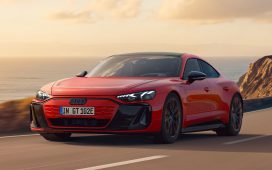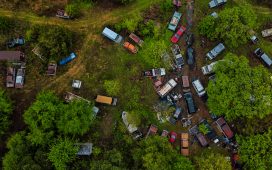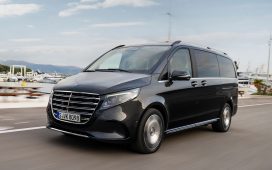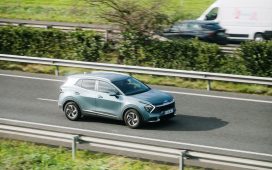Dacia has drawn on its recent Manifesto concept car for the looks of its Sandrider, the car that will form the basis for the value brand’s assault on the Dakar Rally.
Developed in conjunction with British motorsport specialist Prodrive, but with design work from the brand’s own studio, the Dacia Sandrider is a buggy-style, four-wheel-drive creation that will run in the top class for rally raid machinery, Ultimate T1+. It features boxy looks that are clearly inspired by those of the Manifesto, a dramatic concept car that made its debut at the 2022 Paris motor show.
The Dacia Sandrider will be driven by five-time Dakar winner Nasser Al-Attiyah and nine-time World Rally Champion Sebastien Loeb, who is still searching for his first victory in the Dakar but brings extensive experience after working with Prodrive on its Hunter project. Dakar class winner Cristina Gutierrez Herrero will be at the wheel of the third Sandrider.
Tubular construction and carbon-fibre panels feature on the new car – although Dacia says that all superfluous bodywork has been removed to help save weight. It uses double-wishbone suspension throughout, to help cope with the rough terrain typical on rally raids, and features a number of novel features, including anti-infrared pigments in the paint, to help reduce heat soak and its effects on the vehicle.
The Sandrider’s spare wheels are not shrouded, to make them easier to access when changing punctures, and the interior features magnetic elements that are designed to hold tools securely in place when bouncing through the desert.
Like the Manifesto concept, there’s a focus on simplicity with just one front fog light and completely stripped interior. There’s also virtually no overhangs front and rear so the Sandrider should be able to conquer the steepest inclines.
Unlike the all-electric Manifesto, the Sandrider uses a 3.0-litre twin-turbocharged V6 engine, producing 355bhp and 539Nm of torque, and will use sustainable synthetic fuel supplied by Dakar’s partner Aramco.
Sebastien Loeb on the Dacia Sandrider and the Dakar challenge
Sebastien Loeb is on the verge of notching up his half-century, but don’t think for a second that his competitive streak has diminished in any way. As Auto Express catches up with the nine-times World Rally Champion at the launch of Dacia’s first-ever Dakar campaign, the Frenchman admits that victory in the classic endurance event is now his absolute focus.
“It’s a little personal now,” admits Loeb, who was a gymnastics champion before his talent behind the wheel was spotted by then-Citroen team boss Guy Fréquelin. “My main discipline now is cross-country, and the main race is Dakar. So yes, victory is my objective. But it’s not an easy goal.”
That’s a remarkable admission from a man who used to make winning in rallying – arguably one of the less predictable forms of motorsport – look routine. But Loeb has tackled the Dakar eight times and never won it. He’s finished runner-up on three occasions, including in 2023 and 2024.
“It’s different from WRC,” Loeb explains, “because for Dakar, you need to be able to bring everything together over such a long event. It’s 12 or even 14 days where you need to be competitive and not have any big problems. That’s tricky.”
This year’s silver medal was arguably the toughest to take. Based once again in his British-built Prodrive Hunter T1+, Loeb had the pace to rattle favourites such as his own team-mate, Nasser Al-Attiyah, and Audi’s Carlos Sainz.
Loeb won stages and mounted a dogged pursuit of Sainz, but was ultimately undone by suspension failure with only miles to spare. “It was fun to fight,” he says, “but Audi was strong this year. The team had a good car and clever strategy [the Audis ran in formation in later stages, in case Sainz needed assistance]. I think they deserved victory.”
Three years’ experience with the Hunter is being rolled into Dacia’s car – a dramatic buggy called Sandrider – because Prodrive is acting as a technical consultant. Loeb admits that this continuity attracted him to Dacia, where he’ll line up alongside Al-Attiyah again, and 2024 T3 class winner Cristina Gutiérrez Herrero.
“We’ve been able to use our knowledge of the Prodrive car with the Sandrider,” Loeb says. “We know the good and weak points. So to have this base was one of the big reasons to come to Dacia. But I was also impressed by the involvement of the brand and people. They’re really passionate.”
Loeb will spend 2024 developing the Sandrider, while also keeping his hand in with a few appearances in a lesser T3-class racer. The proposed debut for Dacia is at the Rallye du Maroc, the season-closing event in October. But is it realistic to gun for victory on the 2025 Dakar, only a couple of months later?
“I hope so,” Loeb replies. “Last year we didn’t do any more testing with Prodrive, really, but we already know we’ll be doing six weeks of testing before Morocco; that’s more than we did before the debut of the Hunter. We have to hope that with all the experience that has gone into this car, and the good people working on it, we’ll be competitive right from the start. That’s why we’re here; it’s why I’m here.”
Click here for our review of the all-electric Dacia Spring…











